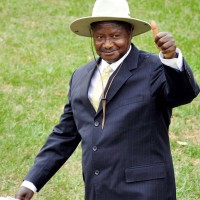To nobody’s real surprise, Uganda’s 70-year-old president since 1986, Yoweri Museveni, picked up nomination forms last week to run for re-election in 2016.

“The historicals [party leaders] agreed that as a way forward, I come and pick these nominations forms and I offer myself for the position of party chairman and NRM presidential candidate for the period 2015-2021,” he said to his supporters.
Museveni secured the presidency through a coup three decades ago, and has been re-elected three times since 1996. A recent poll suggests that 71% of Ugandans will vote for him again for another term, which will move him up the ranking table of Africa’s longest serving leaders.
His thirty years in power have been a mixture of the good, the controversial and the realpolitik. In his early years in office, Museveni was feted by foreign governments, who branded him a reformist. His government received global praise for reducing the rates of HIV infections in the 1990s, which analysts declared could act as a model for how governments fought the spread of AIDS.
The economy was growing fast and education levels improved. All these achievements culminated in a stamp-of-approval visit by then US president Bill Clinton who declared him one of a “new breed” of leaders on the continent.
But the decision to amend the constitution in 2005 to allow him to seek a third term put a dent in this reputation. This shift was accompanied by the stifling of the opposition and the press, including the jailing of political rivals and journalists.
Meanwhile, the UN has accused Uganda—with Rwanda’s help—of supporting the M23 rebels, who are engaged in an armed struggle against the government of Joseph Kabila in the Democratic Republic of Congo. Museveni’s government has strongly denied such involvement. Not the actions of a new breed of leader, analysts argue.
But Museveni has remained an important ally of the US in the region, especially in its counter-terrorism efforts in east Africa. The Ugandan army has contributed forces to the Africa Union-backed efforts to fight al Qaeda affiliated Somali militants al-Shabaab, for example, which the Americans want to neutralize. It is no surprise then that Uganda is a major recipient of US military training in sub-Saharan Africa, and got close to half a billion dollars of economic and military aid in 2014/2015.
In 2013, Museveni hinted that he might not run again only to then declare that Ugandans won’t let him leave. “I don’t think the Ugandans are as obsessed with my retirement, because whenever I go for elections, five million tell me not to go, but stay,” he was quoted as saying.
The elections will see Museveni challenged by his longtime rival Kizza Besigye, at one time Museveni’s personal doctor during the five-year armed struggle that overthrew President Milton Obote. He contested the last three elections as well, which he lost claiming the results were rigged. Another contestant, Amama Mbabazi, a former prime minister, is expected to run as an independent. Soon after declaring their candidacies, they were put in jail under “preventative arrests” but were released twelve hours later without charge.
Museveni released a rap song earlier in the week titled “Yengoma”—drum in Runyankore, a language spoken in south-western Uganda—to announce his candidacy.
“That is his song, the voice is his,” his press secretary Tamale Mirundi confirmed to French news agency AFP. “The president uses many forms to relay messages he considers important, music and proverbs being part of that.”









